Regulation
Ex-SEC Official John Reed Stark to Testify on Crypto Enforcement

John Reed Stark, ex-head of the SEC’s Office of Internet Enforcement, is due to give testimony before the United States House of Representatives Financial Services Committee concerning the regulation of securities laws, particularly in the crypto market, on May 7th. Stark, who has an extensive securities law background, intends to illuminate the obstacles and needs of regulating the digital assets industry.
Stark argues that the SEC’s charges of overreach with “regulation by enforcement” are baseless, saying that what the critics call overreach is actually the SEC doing what it is supposed to do, which is to enforce the law.
SEC’s Approach to Crypto Regulation
In his prepared statement, Stark argues in favor of the current SEC regulatory position, underlining that the specifics of digital assets call for a strong regulatory approach to protect investors.
Stark asserts that the digital asset industry calls SEC Regulation by Enforcement simply enforcement. Thus, he highlights several high-profile crypto failures, such as FTX, that indicate the volatility and risks inherent in the crypto market. Stark argues that these kinds of cases are proof of the need for proper regulations to ensure the safety of investors and the dignity of the capital market.
Stark also provides a historical review of the SEC enforcement and states that the commission has continually changed its enforcement strategy to address new market technologies and concerns. His argument relies on the Howey Test, a standard set by a Supreme Court case in 1946 that has been used for years to determine what constitutes an investment contract in the context of U.S. securities law.
In addition, he believes that Howey Test principles are fully applicable to digital assets and refutes the assertion that the SEC has not given fair notice to the crypto industry.
Judicial Support for SEC’s Crypto Enforcement
The testimony stresses that federal courts have generally upheld the power of the SEC to consider digital assets as securities. Stark alludes to various court decisions where the judges supported the SEC’s actions against the crypto companies, making it clear that the SEC had provided adequate notice through its prior enforcement activities and public guidance. He refers to a judgment that the SEC’s position on crypto assets regulation aligns with the traditional securities law interpretations, providing required legal certainty and enforcement consistency.
In closing his speech, Stark recommends a tougher regulatory framework to address the precise risks digital assets pose. He also argues that they need to work together in creating rules, ensuring that any innovation is not hindered by heavy regulations while underpinning strong investor protection and market integrity.
At the same time, in a message on X, Stark expresses concerns over the current market of digital assets, which he calls a “post-apocalyptic anarchical free-for-all,” in which the majority of the cryptocurrency tokens’ intricacies are not thoroughly put under scrutiny and effectively communicated by those who push them forward.
Crypto Market Challenges and State Interventions
What is crucial to the narrative of Stark in the digital asset sector is that he argues that many in the crypto-verse are mistaken to think these assets do not need the sort of close supervision characteristic of traditional financial markets. He compares this situation to allowing unskilled people to perform complex surgeries, which is why many risks and irresponsibilities come from the lack of regulation.
Hmm, you are probably guessing right my friend — A sample of my thoughts this morning:
Let’s face it — most of the cryptoverse is not the Wild West, but more akin to a Walking Dead-like post-apocalyptic anarchical free-for-all. Promoters are marketing, and the investing public…
— John Reed Stark (@JohnReedStark) May 6, 2024
Additionally, Stark believes that with the SEC’s lack of active enforcement, the digital asset market will become a malpractice and fraud paradise, “drug dealers doing brain surgery.”
Therefore, Stark asserts that the activities in the cryptocurrency market trigger existing securities laws such as the ‘33 Act and the ‘34 Act- due to the nature of digital assets and their trading platforms.
He criticizes digital asset exchanges, brokers, and market makers because they employ terms that create the impression of the level of customer loyalty and protection, which is not true. Stark also says that this causes ‘pseudo masking of investment-related guarantees’ for investors, who have a wrong conception of the very nature of their investments and their inherent risks.
Read Also: Bitwise CIO Claims SEC Crackdown Is Favoring Coinbase
The presented content may include the personal opinion of the author and is subject to market condition. Do your market research before investing in cryptocurrencies. The author or the publication does not hold any responsibility for your personal financial loss.
Regulation
US SEC Acknowledges Fidelity’s Filing for Solana ETF
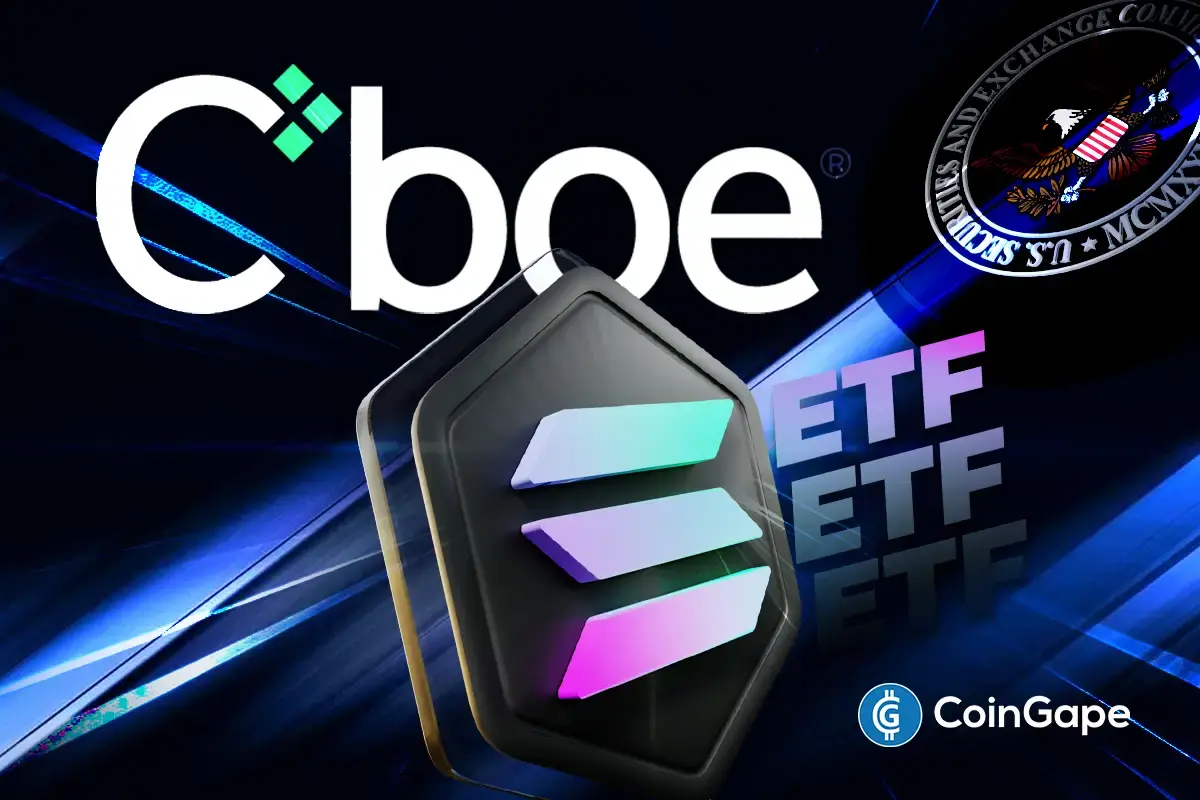
The U.S. Securities and Exchange Commission (SEC) has formally acknowledged the filing for Fidelity’s spot Solana (SOL) Exchange-Traded Fund (ETF).
This marks a key development in the financial industry, as Fidelity seeks to list its Solana ETF on the Cboe BZX Exchange. The acknowledgment comes after Fidelity submitted a proposed rule change, paving the way for the potential approval of the product.
Fidelity’s Spot Solana ETF Proposal
The SEC’s acknowledgment follows Fidelity’s filing to list and trade shares of the Fidelity Solana Fund under the Cboe BZX Exchange. The proposed rule change, initially submitted on March 25, was later amended on April 1, 2025, to clarify certain points and add additional details.
The amended proposal aims to list the Solana ETF under BZX Rule, which pertains to commodity-based trust shares. According to the Cboe BZX Exchange, Fidelity plans to register the shares with the SEC through a registration statement on Form S-1.
Fidelity’s experience with crypto ETFs, having launched the Fidelity Wise Origin Bitcoin Fund (FBTC) and the Fidelity Ethereum Fund (FETH), has prepared it for this new initiative. FBTC has drawn substantial interest, accumulating nearly $17 billion in assets, while FETH currently manages around $975 million.
This Is A Developing News, Please Check Back For More
Disclaimer: The presented content may include the personal opinion of the author and is subject to market condition. Do your market research before investing in cryptocurrencies. The author or the publication does not hold any responsibility for your personal financial loss.
Regulation
US Senate Banking Committee Approves Paul Atkins Nomination For SEC Chair Role
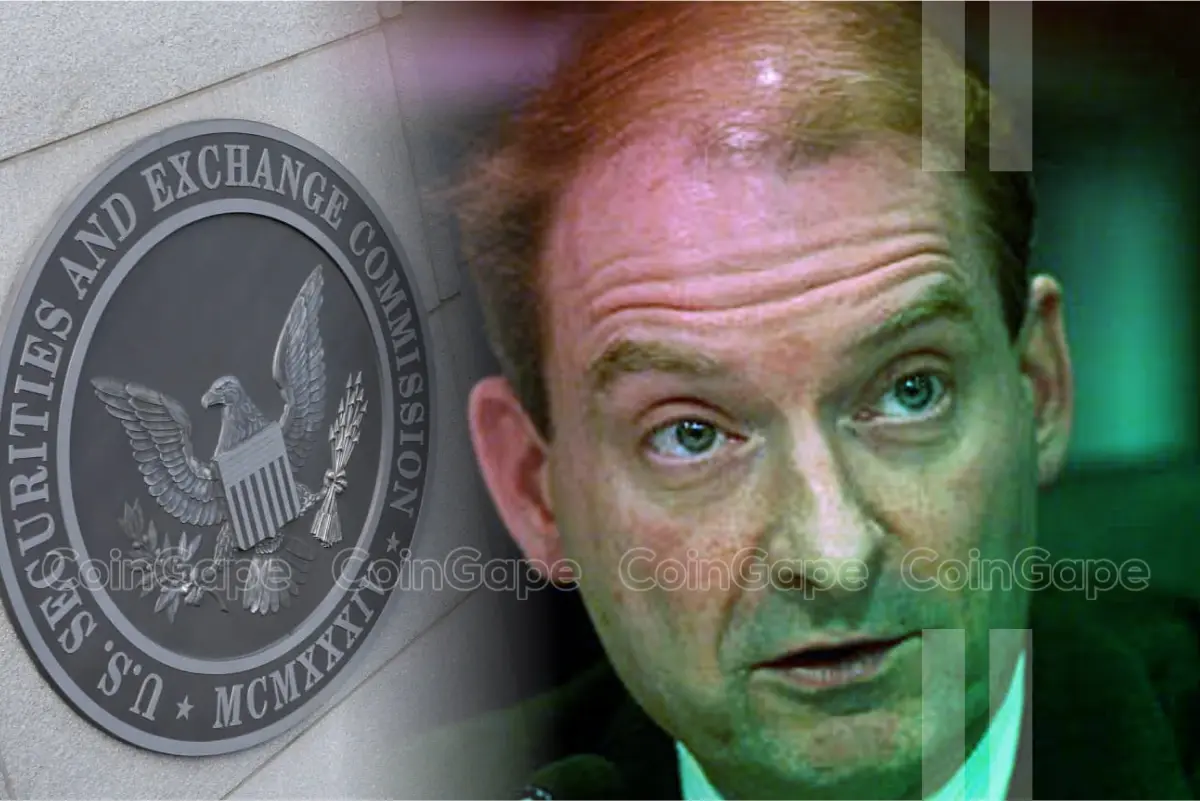
The U.S. Senate Banking Committee has voted to approve Paul Atkins’ nomination for the role of Chair of the Securities and Exchange Commission (SEC). The vote, which took place on Thursday, passed with a narrow margin of 13-11, along party lines.
Paul Atkins, nominated by President Donald Trump, now moves one step closer to taking over the top regulatory position at the US SEC.
Senate Banking Committee Approves Paul Atkins Nomination
Paul Atkins’ nomination for SEC Chair has received approval despite sharp opposition from Democratic members of the Senate Banking Committee. The vote was entirely split, with Republicans supporting Atkins and all Democrats opposing the decision.
This partisan divide highlights the contentious nature of Atkins’ confirmation, which had been under scrutiny for several reasons.
The committee’s approval now clears the path for Atkins to proceed to the full Senate for a final confirmation vote. Given the Republican-controlled Senate, it is widely expected that Atkins will secure the necessary votes to take over the SEC leadership. With Republicans holding a 53-47 majority in the Senate, the confirmation process is anticipated to move forward swiftly.
This Is A Developing News, Please Check Back For More
Disclaimer: The presented content may include the personal opinion of the author and is subject to market condition. Do your market research before investing in cryptocurrencies. The author or the publication does not hold any responsibility for your personal financial loss.
Regulation
Kraken Obtains Restricted Dealer Registration in Canada

Cryptocurrency exchange Kraken has obtained a Restricted Dealer registration in Canada. The registration comes after completing a pre-registration undertaking (PRU) process with Canadian authorities.
The exchange has also announced the appointment of Cynthia Del Pozo as its new General Manager for North America. Del Pozo will oversee Kraken’s growth initiatives in Canada.
Kraken Completes PRU Process In Canada
Kraken’s Restricted Dealer registration marks the completion of a thorough pre-registration undertaking (PRU) process with Canadian regulators. The registration places Kraken under the supervision of the Ontario Securities Commission (OSC). This oversight ensures users have access to secure crypto products within a properly regulated local ecosystem.
According to the Canadian Securities Administrators (CSA), the Restricted Dealer registration is one of eight firm registration types in Canada. This particular classification is used for firms that “do not quite fit under any other category.” It also comes with specific requirements and conditions set by securities regulators.
Kraken’s regulatory achievement comes during a period of change in the Canadian crypto sector. Just months earlier, competitor Gemini exchange announced its departure from the Canadian exchange market by the end of 2024. This was a move that surprised many and raised questions about cryptocurrency regulation clarity in the country.
Kraken Introduces New Canadian GM
Del Pozo has joined Kraken to lead its Canadian operations as the new General Manager for North America. She has nearly 15 years of experience in corporate development, operations, and fintech consulting. Del Pozo will help to guide Kraken’s expansion across Canada during this important phase of crypto’s development in the region.
“Canada is at a turning point for crypto adoption, with a growing number of investors and institutions recognizing digital assets as a vital part of the financial future. I’m thrilled to join Kraken’s mission at this critical moment, and to lead our expansion efforts, ensuring we continue to serve our clients long-term with innovative and compliant products,” said Del Pozo.
In her role, Del Pozo will focus on strengthening Kraken’s regulatory relationships and also scaling the company’s presence throughout North America.
Del Pozo also commented on the registration achievement: “This Restricted Dealer registration is testament to the high bar Kraken has always set for consumer protection, client service, and robust security. We’re excited to continue expanding our world-class investment platform and to deliver innovative products that provide real-world utility to Canadians.”
The Exchange’s Continued Growth In Canada
Over the past two years, the cryptocurrency exchange has shown steady expansion in Canada while working through the PRU process with regulators. During this period, the exchange has doubled its team size and monthly active users.
According to the official blog post figures, the firm now has more than $2 billion CAD in total client assets under custody. Kraken has also increased support for some of the most popular cryptocurrencies. It provides several CAD spot trading pairs that enable Canadians to trade crypto without paying expensive foreign exchange fees.
According to Innovative Research Group’s 2024 Investor Survey, 30% of Canadian investors currently own or have owned cryptocurrencies. Likewise, a KPMG Canada survey discovered that 30% of Canadian institutional investors now have exposure to cryptocurrencies, which means widespread adoption across investor types.
Disclaimer: The presented content may include the personal opinion of the author and is subject to market condition. Do your market research before investing in cryptocurrencies. The author or the publication does not hold any responsibility for your personal financial loss.
-

 Altcoin24 hours ago
Altcoin24 hours agoAltcoin Season Still In Sight Even As Ethereum Struggles To Gain Upward Momentum
-

 Market23 hours ago
Market23 hours agoBinance’s CZ is Helping Kyrgyzstan Become A Crypto Hub
-
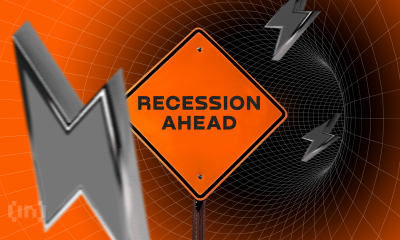
 Market22 hours ago
Market22 hours agoCrypto Market Mirrors Nasdaq and S&P 500 Amid Recession Fears
-
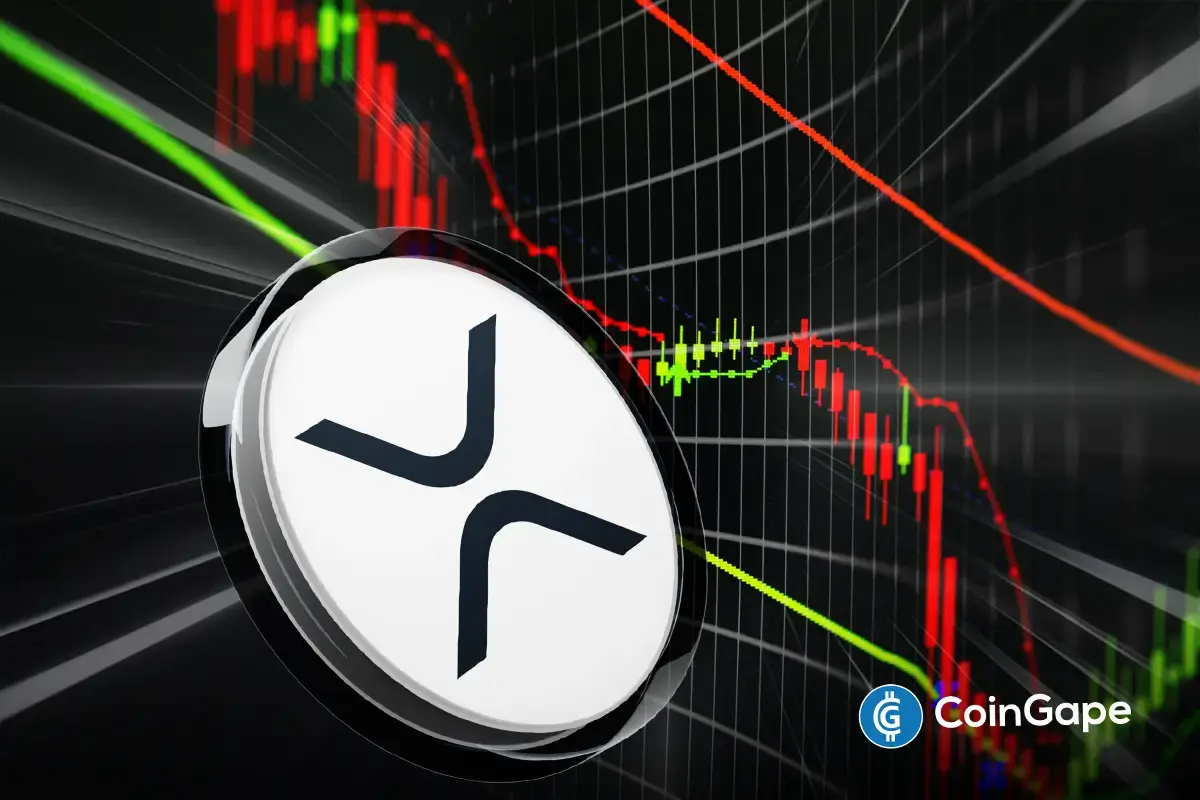
 Altcoin22 hours ago
Altcoin22 hours agoExpert Reveals XRP Price Could Drop To $1.90 Before Rally To New Highs
-
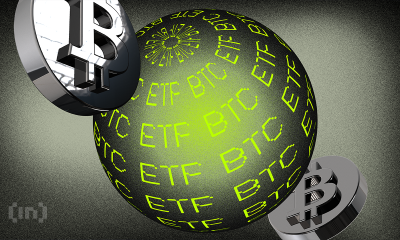
 Bitcoin20 hours ago
Bitcoin20 hours agoWhy ETF Issuers are Buying Bitcoin Despite Recession Fears
-

 Ethereum18 hours ago
Ethereum18 hours agoEthereum Faces ‘Hyperinflation Hellscape’—Analyst Reveals Key On-Chain Insights
-

 Market18 hours ago
Market18 hours agoWhat to Expect After March’s Struggles
-

 Market17 hours ago
Market17 hours agoBitcoin Price Still In Trouble—Why Recovery Remains Elusive






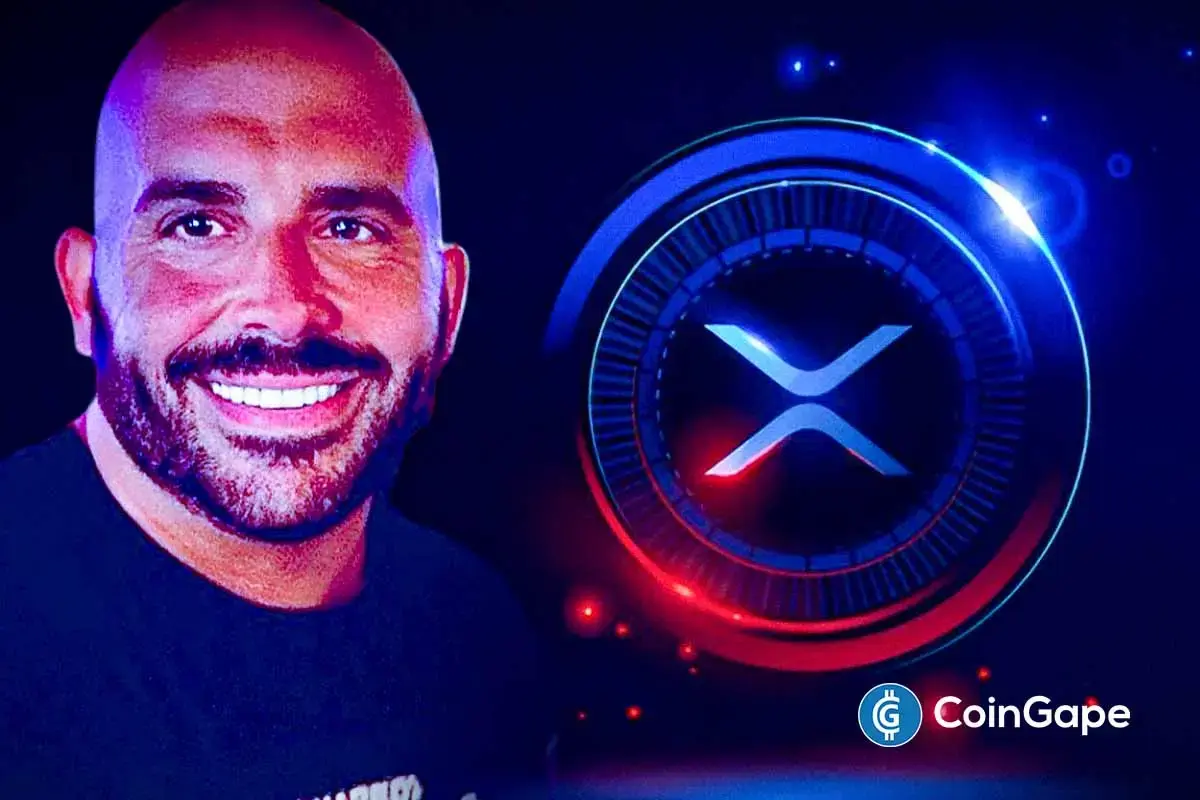














✓ Share: